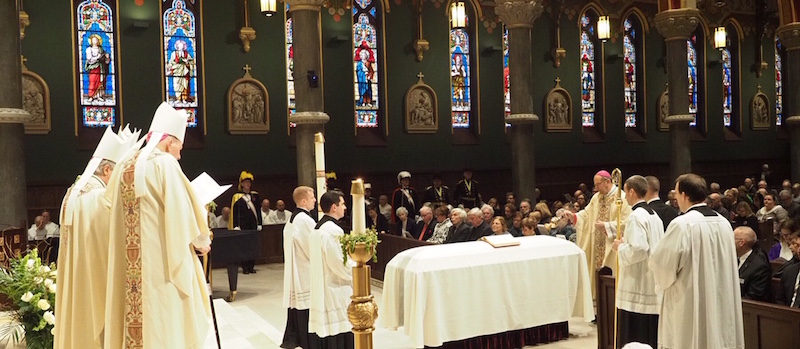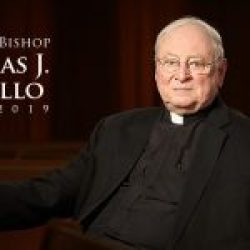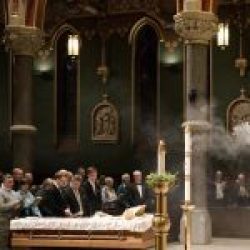Bishop Robert J. Cunningham incenses the casket of Auxiliary Bishop Thomas J. Costello during the Mass of Christian Burial at the Cathedral of the Immaculate Conception in Syracuse Feb. 22. (Sun photo | Chuck Wainwright)
By Renée K. Gadoua | Contributing writer
For the 10 years Liz DeLaney served as Auxiliary Bishop Thomas J. Costello’s secretary, she’d answer his phone and tell him someone wanted to talk with him. “Put him through,” the bishop would say. “No ‘Who is it? What does he want?’” DeLaney recalled. Usually he simply picked up the phone and said, “Tom Costello. How can I help you?”
DeLaney, one of hundreds of mourners at services Feb. 21 and 22, remembered the longtime auxiliary bishop for his kind, gentle, and welcoming ministry. “He was there for anyone,” she said through tears. “How can we be without him?”
Friends and colleagues, clergy and lay, prominent and not shared tearful memories during vigil services and a funeral Mass at the Cathedral of the Immaculate Conception, the central church of the seven-county diocese and the site of Bishop Costello’s 1954 ordination as a priest and 1978 installation as a bishop. He was laid to rest in his family plot at St. Peter’s Cemetery in Rome, N.Y., Feb. 22, a day before what would have been his 90th birthday. Bishop Costello died Feb.15 after serving the diocese nearly 65 years.
During a brief, quiet vigil service Feb. 21, Bishop Robert J. Cunningham praised Bishop Costello as a faithful priest, a “champion of the underdog” who was “eager to accompany those who were searching for peace and healing.”
Bishop Costello “was always ready to be where the wound was,” Bishop Cunningham said to about 300 people. “Tom Costello showed us the way.”
“Throughout it all, however, he had a deep and abiding love for God and his church,” he said. “I’m confident that he can stand by the judgment seat of Christ knowing that he did his best to please the Lord.”
Bishop Cunningham acknowledged the “tragic and sad” impact of the clergy sex abuse scandal and noted that Bishop Costello remained faithful. “I hope you will continue to love the Church as Tom did,” he said.
Mourners prayed at Bishop Costello’s casket, some tapping the side and others touching his shoes as a sendoff. Friends and colleagues exchanged stories, while others sat quietly, deep in thought or prayer.
Syracuse Mayor Ben Walsh paid his respects Thursday, as did dozens of diocesan priests. So did a man who sat alone in a back pew. The man said Bishop Costello heard his confession 30 years ago when he wanted to return to the church. “He took the time to teach me the Act of Contrition,” the man said. “He didn’t scold me. He just said a line and I said a line. It came back to me.”
Sister Kathleen Eiffe, CSJ, former diocesan director of the Office of Faith Formation, and Sister Mary Anne Heenan, CSJ, former Catholic schools superintendent, greeted members of their community who traveled from Latham. “When I heard [he died] I cried and couldn’t stop,” one sister said Thursday before embracing friends.
Half an hour before the funeral Mass Friday, the cathedral was half full. More than 70 diocesan priests, three Jesuits from Le Moyne, several Franciscan friars, and 24 deacons attended, as did several clergy from other Christian denominations. Daniel Jezer, rabbi emeritus of Syracuse’s Beth Sholom-Chevra Shas and his wife, Rhea Jezer, sat near the front during Mass. Rabbi Jezer and Bishop Costello worked together on numerous social justice issues over the years.
Four bishops traveled to Syracuse for the funeral: Rochester Bishop Salvatore R. Matano, retired Rochester Bishop Matthew Clark, retired Albany Bishop Howard Hubbard, and Ogdensburg Bishop Terry LaValley. Cardinal Timothy Dolan of the Archbishop of New York was to have presided at Mass, but canceled, citing illness.
“He was a leader in implementation of Vatican II, not only in Syracuse, but in many parts of the U.S.,” Bishop Clark said of his longtime friend and colleague. “He was recognized around the country for his initiatives.”
Several people noted that Bishop Costello, notoriously unpretentious, favored simple events over the pomp and circumstance of the funeral Mass. “He would be OK with this,” Bishop Clark said of Friday’s turnout, which nearly filled the cathedral’s pews.
“Good man, good man, good man,” said Paul Welch, director of the diocese’s Social Justice Ministry who has long admired Bishop Costello’s social justice advocacy and support for greater women’s roles in the church.
Carl Thomas, former director of the Higher Education Opportunity Program at Le Moyne College, remembered the late bishop as a strong supporter of the community. It was no accident, he said, that Bishop Costello lived at St. Anthony of Padua’s rectory on Syracuse’s South Side. “That was part of who he was,” Thomas said. “He was very concerned with people of color. It was all part of his narrative.”
Michael DeSalvo admired Bishop Costello for providing “a real life example of what God’s love was really about.” He and Nick Orth opened their home in 1992 to minister to people dying of HIV/AIDS. “I always admired his courage and ability to focus on the justice of all people,” DeSalvo said.
Each of the diocese’s 22 schools sent at least one representative, a nod to the important place Catholic education held in Bishop Costello’s career and heart. He served as superintendent of schools from 1960 to 1975.
Close friends, colleagues, and relatives participated in the Mass, proclaiming readings and presenting the gifts. Bishop Cunningham used Bishop Costello’s silver chalice, engraved with his name and date of ordination and featuring the diamond from his mother’s engagement ring, which he had affixed after she died in 1994.
Msgr. Charles Fahey’s homily recounted the high points of Bishop Costello’s life, including attending meetings of Vatican II and bringing the energy and hope back to the Diocese of Syracuse. He praised him as a “gifted communicator” in ministry, leadership, and advocacy.
“Whether talking in a parish or in Albany or whenever he admonished people, which he was wont to do, he never did it alone,” said Msgr. Fahey, who knew Bishop Costello 57 years. “It was always what ‘we’ ought to do. ‘We’ are on the journey.”
He praised the former superintendent for his foresight in creating centralized Catholic high schools as enrollment declined and transforming Bishop Ludden school property into St. Camillus nursing home. “It wouldn’t have happened were it not for his enthusiasm,” Msgr. Fahey said of those 50-year-old decisions.
Msgr. Fahey noted the influence of the late Msgr. Charles Brady (1901-1978), who Bishop Costello credited with teaching him about systems that created racism, poverty, and other forms of injustice.
“Requiescat in pace, gorgeous little Tom,” he said, using a Msgr. Brady-style endearment.
And the congregation responded, “Amen.”
Renée K. Gadoua, a freelance writer and editor, has covered Bishop Costello for more than 30 years. She previously worked as a Catholic Sun staffer and religion reporter for The Post-Standard/syracuse.com. Follow her on Twitter @ReneeKGadoua.
Watch video of the Mass of Christian burial below, courtesy Syracuse Catholic Television.







